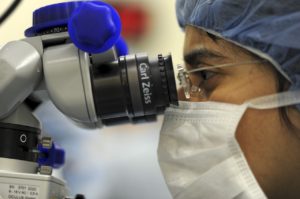Veterinary Studies (Veterinary Clinical Studies, Veterinary Clinical Trials)
 Veterinary clinical trials generally fall into several categories, from proof of concept (POC) veterinary studies to pivotal studies:
Veterinary clinical trials generally fall into several categories, from proof of concept (POC) veterinary studies to pivotal studies:
Pilot studies and Proof of Concept (POC) Studies – these are usually smaller veterinary studies intended to obtain preliminary data to evidence safety and/or efficacy. Veterinary pilot studies, often termed proof of concept (POC) studies, are normally not intended for supporting a regulatory submission. Certain pilot veterinary clinical studies may be subject to permission from state or federal agencies before starting the study, and sponsors should be familiar with the regulatory requirements beforehand.
Target Animal Safety Studies (TASS) – These studies are intended to assess the safety of a veterinary drug, veterinary biologic, or other veterinary product in the target species. Target species refers to the species in which the product is intended to be given, such as a dog, cat, horse, etc. Depending on the regulatory requirements, target animal safety studies may require dose escalation to gain a better understanding of investigational veterinary product tolerance. Target animal safety studies may be performed by contract research organizations. In certain situations, veterinary safety studies can also be performed in the field setting.
Target Animal Effectiveness Studies (TAES) – Target animal effectiveness studies are those conducted in the target species to establish efficacy (effectiveness). These studies are normally conducted under Good Clinical Practice (GCP) conditions and used in support of substantial evidence of effectiveness. GCP should be conducted based on the the International Cooperation on Harmonisation of Technical Requirements for Registration of Veterinary Medicinal Products (VICH) VICH GL9- Good Clinical Practice (PDF – 356KB).
Sites: Sponsors should carefully select veterinary clinical trials sites to qualify the site and investigator(s). Selection of a trial site often takes place during a site qualification visit (SQV). The site initiation visit (SIV) can sometimes take place during the process of qualifying the site.
Investigators and Research Coordinators: Sponsors should select qualified, experienced investigators to perform veterinary clinical trials which are subject to Good Clinical Practice. Most sites will have a Principal Investigator (PI). The PI can further delegate certain responsibilities to veterinary study team personnel through a Delegation of Authority (DOA). Ultimately, the PI is responsible for all study activities that occur before, during and after the study at their respective veterinary trial site.
Monitoring: During the course of certain veterinary clinical studies, it may be advisable to have qualified veterinary study monitors visit the veterinary trial sites to review records, source documents, and other materials which are important for the integrity of the study. Monitoring visits should occur before, during, and after a study has completed enrollment.
Veterinary Clinical Trials should, in most cases, be reduced to a protocol. Sections of the protocol may include, but not necessarily be limited to:
 PURPOSE OF THE INVESTIGATION
PURPOSE OF THE INVESTIGATION
- Description of the Investigational Product
- Intended use of the Investigational Product
- Objectives and the clinical study (primary and secondary objectives)
 CLINICAL PROTOCOL
CLINICAL PROTOCOL
- Protocol Identifier, Title, Version Number and Date
- Study Design and Schematic
- Subject Selection
- Anticipated Number of Subjects
- Inclusion and Exclusion Criteria
- Study Procedures
- Consenting and Screening Procedures
- Investigational Product Administration
- Study Subject Groupings, Randomization and Blinding
- Schedule of Study Visits
- Procedures to Assess Safety and Efficacy, and Study Outcome Evaluations
- Sample Size Determination and Data Analysis (statistical analysis)
- Risk Analysis, Adverse Event Definitions and Reporting
- Patient Withdrawal and Rescue, and Study Monitoring Procedures
- Study Recruitment and Retention Procedures
- Regulatory Information (IACUC, FDA-CVM, etc.)
- Data Management and Storage, Document Retention
- Study Contacts (Study Team Members, Delegation of Authorities, etc.)